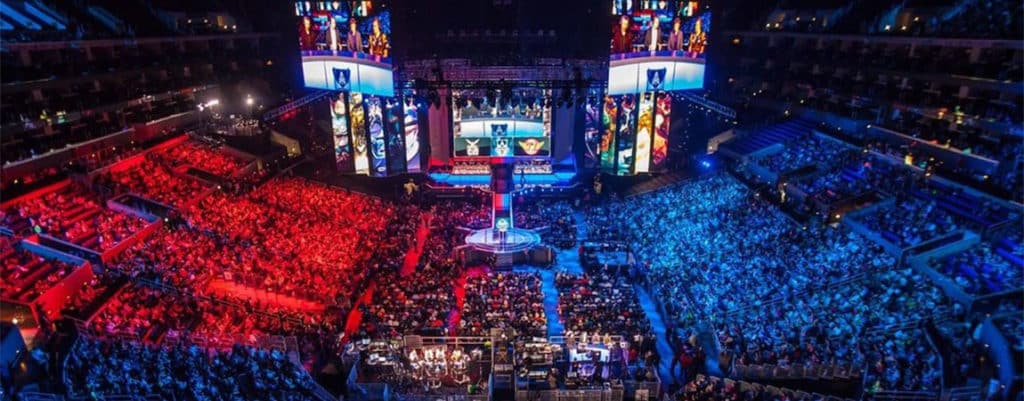Ad (contains affiliate links; you must be aged 18+ to bet; be gamble aware)
Competitive video gaming, also known as esports, has become increasingly popular over the past decade. Events like the League of Legends World Championship, Dota 2’s The International, and the Evolution Championship Series fighting game tournament fill massive arenas with cheering fans.
Top esports competitors can earn millions in tournament prizes and endorsements, and the top esports organisations, including Team Liquid and Cloud9, are worth millions. Some mind-boggling stats include:
- The esports industry was expected to be worth more than $1.6 billion in 2023
- Team Liquid has won nearly $50 million in prizes according to Esports Earnings
- Esports sponsorships are expected to generate some £640+ million each year
- The US had the biggest forecasted esports market share – 28.7% in 2023, with China in second place
- Dota 2 has the biggest cumulative prize pool – more than $32 million in 2023 according to Esports Earnings
Are Esports Still Sports?
Esports and traditional sports share many key traits like extensive training regimens, reliance on skill/strategy, large fanbases emotionally invested in favourite teams/players, major tournaments, lucrative pay and endorsements for top talents, and competitive drive to be the best. The parallel motivations and dedication to win among both esports athletes and physical athletes showcase striking competitiveness commonalities.
However, despite its many similarities to traditional athletic competitions, there is still debate around whether esports qualify as actual “sports”.
Those who argue esports aren’t sports point out the lack of significant physical demands compared to sports like football or basketball. Professional gamers primarily utilize mental skill, reflexes and strategy to outplay opponents.
Some also argue that typical sports connote open-air competition and the outdoors, while esports mostly involves sitting at a computer. There is VR esports but it’s not popular.
Arguments for and Against Esports as Sports
That said, proponents see enough parallels in terms of training, skill, fanship, competition and entertainment value to classify esports under the broad umbrella of “sports”.
Esports competitors still need tremendous focus, persistence, coordination and mental resilience – skills akin to what top physical athletes require for success. Learning complex games also demands extensive strategy and teamwork. The training regimens for elite gamers now mirror the intense routines of pro athletes, too, involving hours of daily practice plus physical fitness plans.
Much like passionate sports fans, esports fans emotionally invest themselves into teams and players within popular leagues centered around games like League of Legends, Counter-Strike and Fortnite. They examine player statistics, follow roster moves, make predictions and endlessly debate amongst peers the way traditional fans do.
Game tournament streams generate millions of engaged, hyped online viewers. The emergence of college scholarship programs specifically for gaming shows how seriously schools now take the competitive gaming talent development pipeline too.
Still, some contend that the physical skills and fitness demanded of athletes ultimately make a difference with how society should categorize competitions.
Labelling esports equivalently as sports could be seen as minimizing the physical achievements associated with competitions like basketball or gymnastics where world-class conditioning, balance, and fine motor control separate top performers from amateurs in ways not seen with gaming.
Esports Gambling and Betting
The debate around classifying esports as actual sports extends into the world of gambling as well. As competitive gaming tournaments become big business, numerous online sportsbooks and casinos now offer odds and opportunities to bet real money on esports matches, such as the best rated by iGaming specialist, which looks at recommended casinos in Ontario. While legal in places like Canada, parts of Europe, Australia, and elsewhere, esports betting remains a controversial issue in the United States, where wagering on athletic competitions has complex regulations.
The growing bets on competitive gaming have some politicians wanting tighter restrictions in general around video game gambling.
But with live streaming services like Twitch popularizing esports to global audiences the way traditional networks broadcast athletic events, the inclusion of esports betting products by casinos aims to capture a new generation of potential gamblers.
Esports will Continue Pushing for Mainstream Acceptance
Professional video game competitions will continue to be debated on whether they properly fit under the “sports” definition. The companies behind games like League of Legends and Counter-Strike certainly make the case for qualification via major tournaments like League’s World Championship or Counter-Strike: Global Offensive’s Majors that pack stadiums and offer multi-million dollar prizes. For now, the International Olympic Committee still does not classify esports as a sport, but does have some esports side events.
However, as competitive gaming keeps growing, the arguments about their athletic merits likely will be challenged. More research into the mental resilience and quick decision-making abilities of top esports talents could uncover unique cognitive abilities on par with elite physical talents in traditional sports.
So, while physical and mental skills don’t always cleanly overlap, both remain crucial to the highest levels of both traditional sports and esports. For some, these shared competitive traits that unite hardcore gamers and athletes make the esports versus sports debate superficial.
In the end, both demand a blend of talent and extensive mental acumen to rise to the top.



